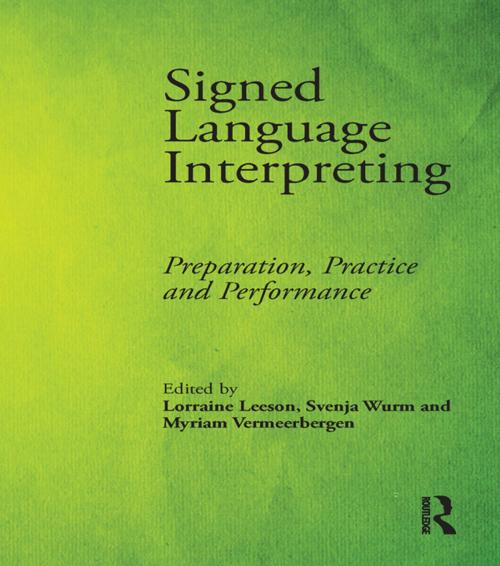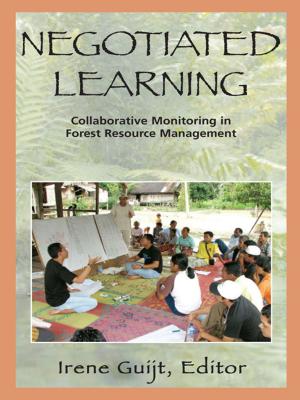Signed Language Interpreting
Preparation, Practice and Performance
Nonfiction, Reference & Language, Language Arts, Linguistics| Author: | ISBN: | 9781317641469 | |
| Publisher: | Taylor and Francis | Publication: | April 8, 2014 |
| Imprint: | Routledge | Language: | English |
| Author: | |
| ISBN: | 9781317641469 |
| Publisher: | Taylor and Francis |
| Publication: | April 8, 2014 |
| Imprint: | Routledge |
| Language: | English |
Signed language interpreting continues to evolve as a field of research. Stages of professionalization, opportunities for education and the availability of research vary tremendously among different parts of the world. Overall there is continuing hunger for empirically founded, theoretically sound accounts of signed language interpreting to inform practice, pedagogy and the development of the profession.
This volume provides new insights into current aspects of preparation, practice and performance of signed language interpreting, drawing together contributions from three continents. Contributors single out specific aspects of relevance to the signed language interpreting profession. These include preparation of interpreters through training, crucial for the development of the profession, with emphasis on sound educational programmes that cover the needs of service users and the wide-ranging skills expected from practitioners. Resources, such as terminology databases, are vital tools for interpreters to prepare successfully for events. Practice oriented, empirical investigations of strategies of interpreters are paramount not only to increase theoretical understanding of interpreter performance, but to provide reference points for practitioners and students. Alongside tackling linguistic and pragmatic challenges, interpreters also face the challenge of dealing with broader issues, such as handling occupational stress, an aspect which has so far received little attention in the field. At the same time, fine-grained assessment mechanisms ensure the sustainability of quality of performance. These and other issues are covered by the eighteen contributors to this volume, ensuring that the collection will be essential reading for academics, students and practitioners.
Signed language interpreting continues to evolve as a field of research. Stages of professionalization, opportunities for education and the availability of research vary tremendously among different parts of the world. Overall there is continuing hunger for empirically founded, theoretically sound accounts of signed language interpreting to inform practice, pedagogy and the development of the profession.
This volume provides new insights into current aspects of preparation, practice and performance of signed language interpreting, drawing together contributions from three continents. Contributors single out specific aspects of relevance to the signed language interpreting profession. These include preparation of interpreters through training, crucial for the development of the profession, with emphasis on sound educational programmes that cover the needs of service users and the wide-ranging skills expected from practitioners. Resources, such as terminology databases, are vital tools for interpreters to prepare successfully for events. Practice oriented, empirical investigations of strategies of interpreters are paramount not only to increase theoretical understanding of interpreter performance, but to provide reference points for practitioners and students. Alongside tackling linguistic and pragmatic challenges, interpreters also face the challenge of dealing with broader issues, such as handling occupational stress, an aspect which has so far received little attention in the field. At the same time, fine-grained assessment mechanisms ensure the sustainability of quality of performance. These and other issues are covered by the eighteen contributors to this volume, ensuring that the collection will be essential reading for academics, students and practitioners.















